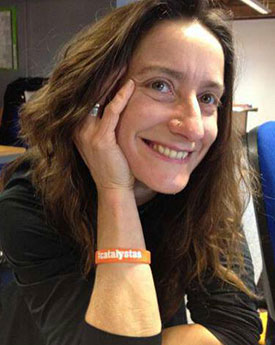Please join us at 4pm on May 10, 2018 for a DCI Lecture in BL 417 (Bissell building, 4th floor) by this year’s Fellow at the DCI, Dr. Marie Ferrario from the University of Lancaster!
Values in Computing, Connecting the Bits.
As we watch digital technology unleashing its power on personal, social and organizational aspects of human life, we also witness its embroilment in software scandals and questionable ‘smart’ practices micro-targeting people’s emotions and deeply held values at an unprecedented scale. I argue that the time is up for shifting the focus from understanding how digital technologies can change people’s lives to a better understanding of how such technologies come to life and ‘behave’. Specifically, my research stems from the need for empirically informed approaches to the study of values underpinning computing research, education and industry. The overarching goal is to support the next generation of computing professionals in research, industry, government, and education with the deliberative and critical skills necessary to tell what values are worth pursuing from those that are potentially harmful to self and society. This talk introduces some of the tools and emerging findings from my latest work at Lancaster University, UK and from activities carried out at UofT as part of the M. McLuhan Centenary Fellowship. A broader perspective on the issues connecting tech industry, academic research, and governance will be thrown into the mix as well as provocations from the current state of affairs and the metaphysical roots of the binary system.
Bio:
Maria Angela Ferrario is a Lecturer in the School of Computing and Communications, Lancaster University, UK, and M. McLuhan Centenary Fellow in Digital Sustainability at the DCI, University of Toronto. She has a background in computer science/AI, interaction design, philosophy and social psychology. Working at the intersection of human computer interaction (HCI) and software engineering (SE), her research interests lie in agile and participatory methods to technology development and the role of digital technology in environmental and societal changes. Maria Angela is experienced in leading complex and distributed community-university partnerships that include hard-to-reach groups such as the homeless, rural island communities and adult with autism. Before joining academia, she worked with a not-for-profit European agency supporting peace building and reconciliation in the Irish cross-border through technology and economic development.
Website: http://www.lancaster.ac.uk/people-profiles/maria-angela-ferrario

